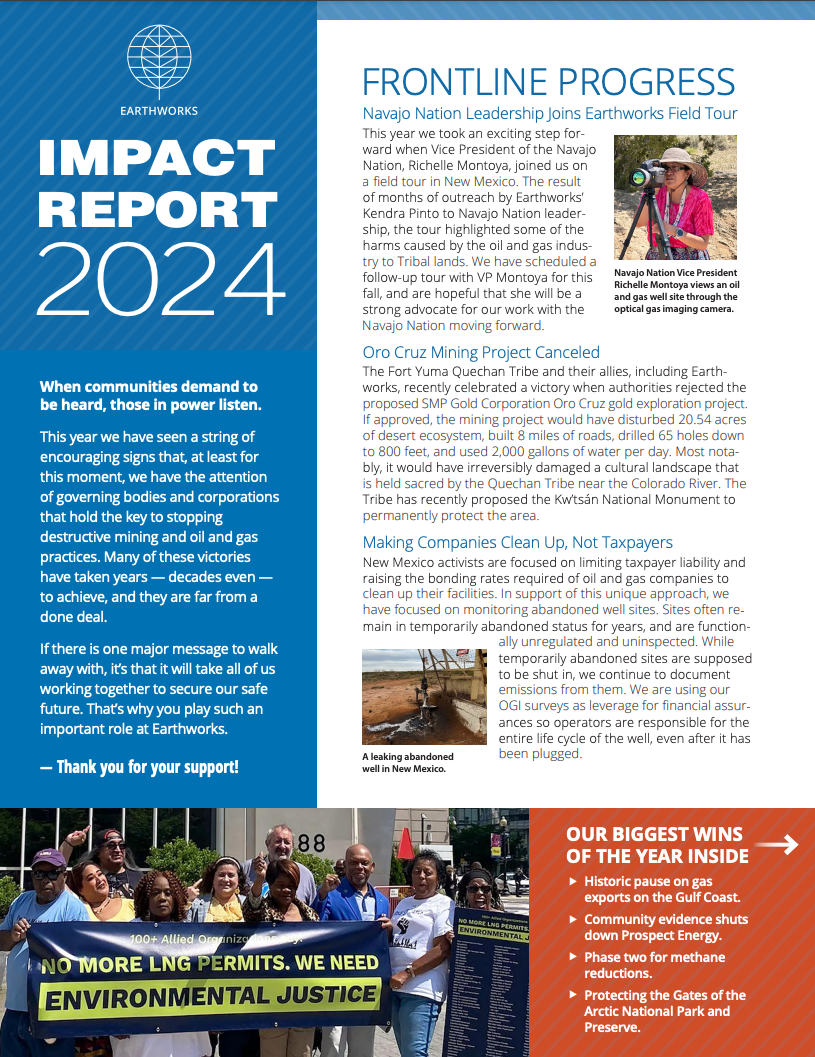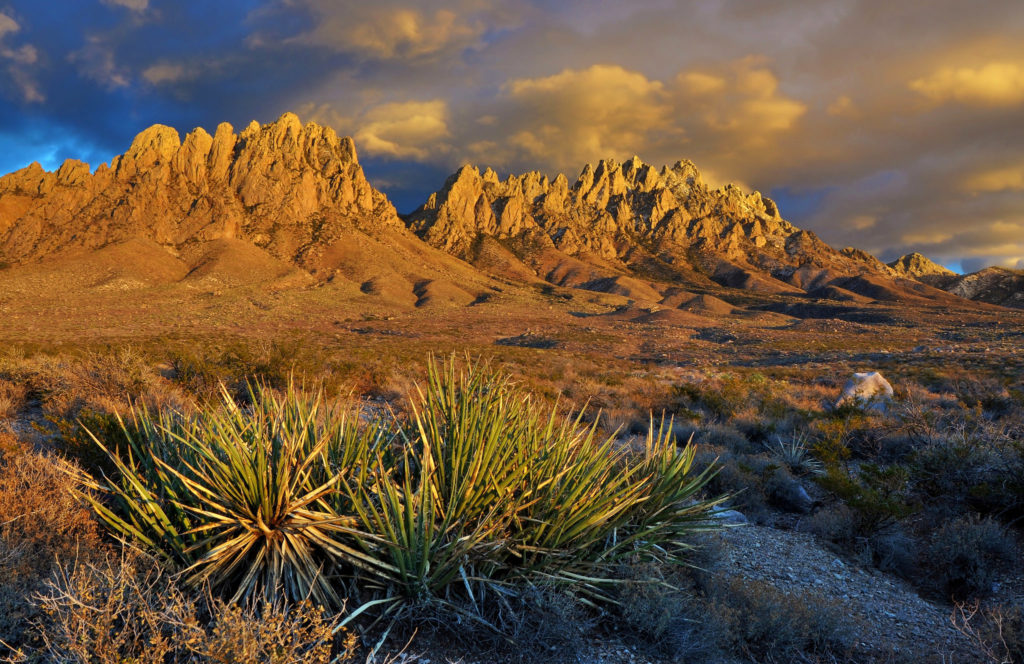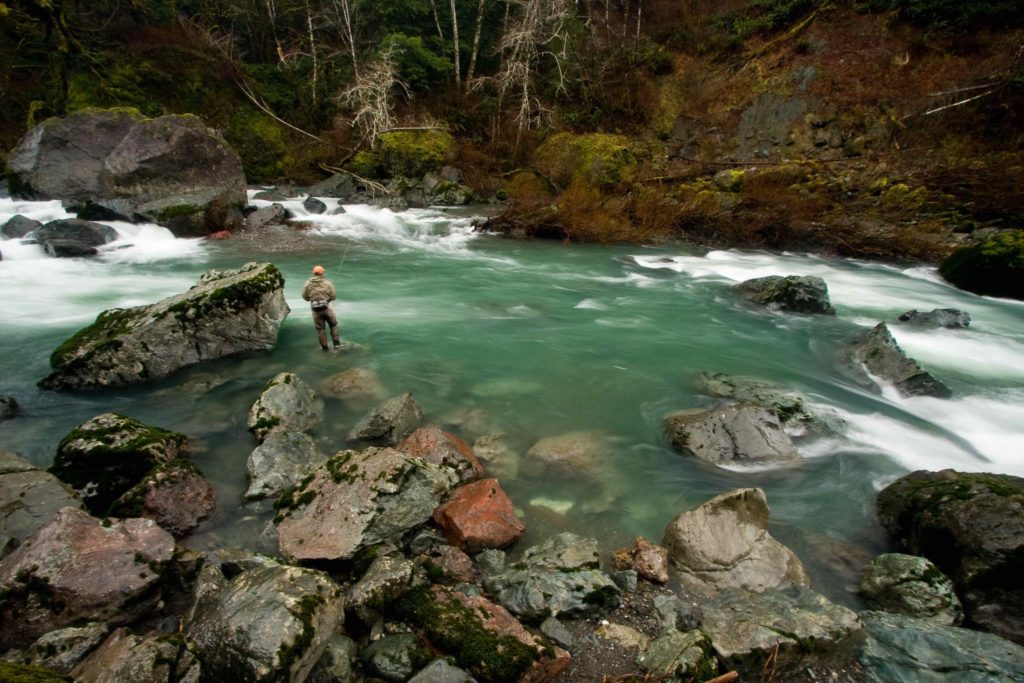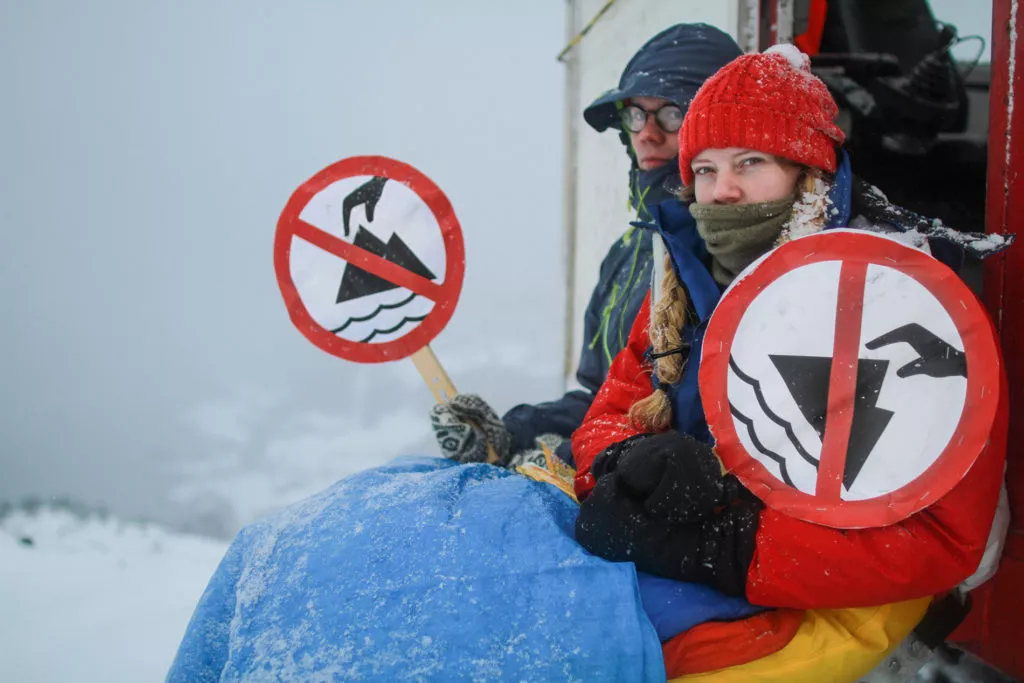Frontline Victories
Navajo Nation Leadership Joins Earthworks Field Tour
This year we took an exciting step forward when Vice President of the Navajo Nation, Richelle Montoya, joined us on a field tour in New Mexico. The result of months of outreach by Earthworks’ Kendra Pinto to Navajo Nation leadership, the tour highlighted some of the harms caused by the oil and gas industry to Tribal lands. We have scheduled a follow-up tour with VP Montoya for this fall, and are hopeful that she will be a strong advocate for our work with the Navajo Nation moving forward.
Oro Cruz Mining Project Canceled
The Fort Yuma Quechan Tribe and their allies, including Earthworks, recently celebrated a victory when authorities rejected the proposed SMP Gold Corporation Oro Cruz gold exploration project. If approved, the mining project would have disturbed 20.54 acres of desert ecosystem, built 8 miles of roads, drilled 65 holes down to 800 feet, and used 2,000 gallons of water per day. Most notably, it would have irreversibly damaged a cultural landscape that is held sacred by the Quechan Tribe near the Colorado River. The Tribe has recently proposed the Kw’tsán National Monument to permanently protect the area.
Making Companies Clean Up, Not Taxpayers
New Mexico activists are focused on limiting taxpayer liability and raising the bonding rates required of oil and gas companies to clean up their facilities. In support of this unique approach, we have focused on monitoring abandoned well sites. Sites often remain in temporarily abandoned status for years, and are functionally unregulated and uninspected. While temporarily abandoned sites are suppose to be shut in, we continue to document emissions from them. We are using our OGI surveys as leverage for financial assurances so operators are responsible for the entire life cycle of the well, even after it has been plugged.
2024 Big Wins Across the U.S.


Construction Halted on Ambler Road Project— Alaska
A disruptive 211-mile industrial mining road harming wildlife, salmon and clean water is probably the last thing you expect to see in national parklands. This was almost the future for Gates of the Arctic National Park and Preserve and adjacent lands, until communities and Tribal members stepped in to advocate for the land’s protection from the proposed Ambler Road.
Since 2021, we have worked alongside frontline communities and Tribes to stop this project. This past December, Earthworks’ Bonnie Gestring joined a fly-in visit to Washington, D.C. for three Alaskan Tribes and our conservation partners to meet with key stake-holders so that Tribal members could express their concerns about the proposed road and its impacts to their livelihoods. We also helped mobilize 3,588 public comments delivered to the Bureau of Land Management that expressed opposition to the road.

An Historic Pause on Gas Exports—Gulf Coast
In the fall of 2023, 75,000 people from across the country gathered in New York City as part of Climate Week to pressure the Biden administration to stop federal approvals of fossil fuel projects, declare a climate emergency and usher in a just transition. Earthworkers and our allies from the Gulf Coast joined the crowd. Over the past year, Earthworks had worked in coalition to organize these efforts as part of #EndFossilFuels, and the moment represented a culmination of those efforts.

Community Evidence Shuts Down Prospect Energy— Colorado
Von Bortz knew something was wrong when the sulfuric, rotten egg smell started and he was getting dizzy, with severe headaches and nausea. Bortz lives in Larimer County, Colorado, which is home to 370,000 people and 105 active drilling wells. A mismanaged oil and gas operation can hurt a lot of people. And it did. He knew there was oil and gas drilling nearby, but he didn’t think it would make him sick. However, Bortz learned that he was getting sick from ongoing exposure to toxic hydrogen sulfide — by pollution from a company called Prospect Energy.

Methane Rule Next Steps: Pushing for Action— Federal
After the EPA finalized updates to federal methane regulations, which could reduce methane by 58 million tons between 2024 and 2038, we knew we had to step up and make sure the regulations are properly implemented and enforced. A key to make these regulations a success is strong implementation by state and Tribal governments. While we celebrate this big win, we continue to mobilize to achieve durable methane reductions to protect our climate for future generations.
Here’s our plan moving forward: Earthworks will focus its engagement in four states — Colorado, New Mexico, Pennsylvania and Texas — that account for upward of 50 percent of total U.S. oil and gas production.

Toxic Waste Loophole
In Pennsylvania, community members are experiencing adverse health impacts in areas where oil and gas companies have been allowed to spread toxic slurry on county roads as a form of dust reduction. Earthworks’ Charlie Palladino collaborated with Pennsylvania state legislators, including Representative Greg Vitali, Chairman of the Pennsylvania House Environmental Resources and Energy Committee, to write a bill enforcing an outright ban on road spreading, eliminating any possibility of loopholes or misinterpretation in the future. The bill recently passed out of committee and now faces a full House vote, where it is expected to receive significant opposition in the Senate.
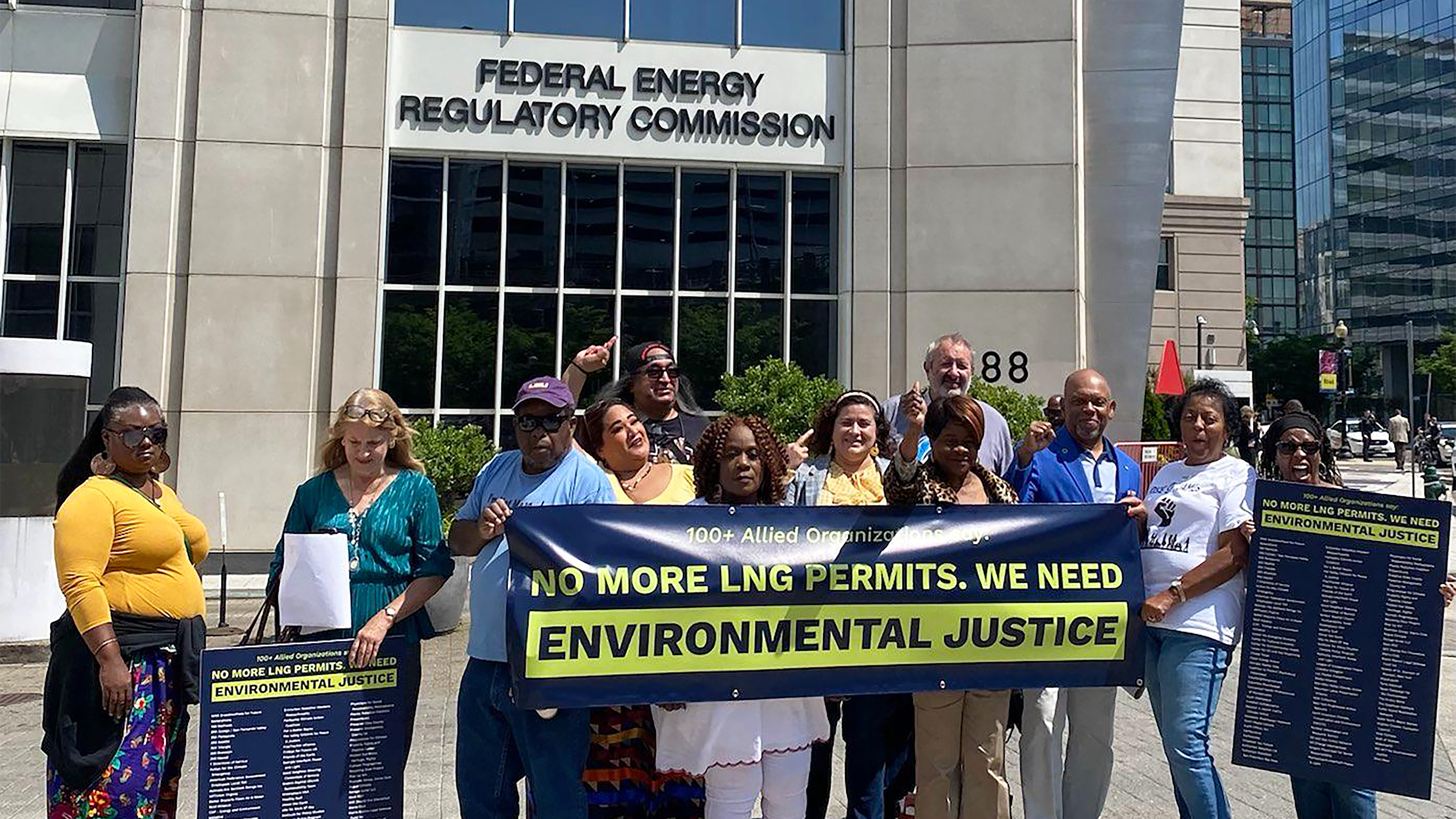
Earthworks’ Influence Helps Strengthen United Nations Report
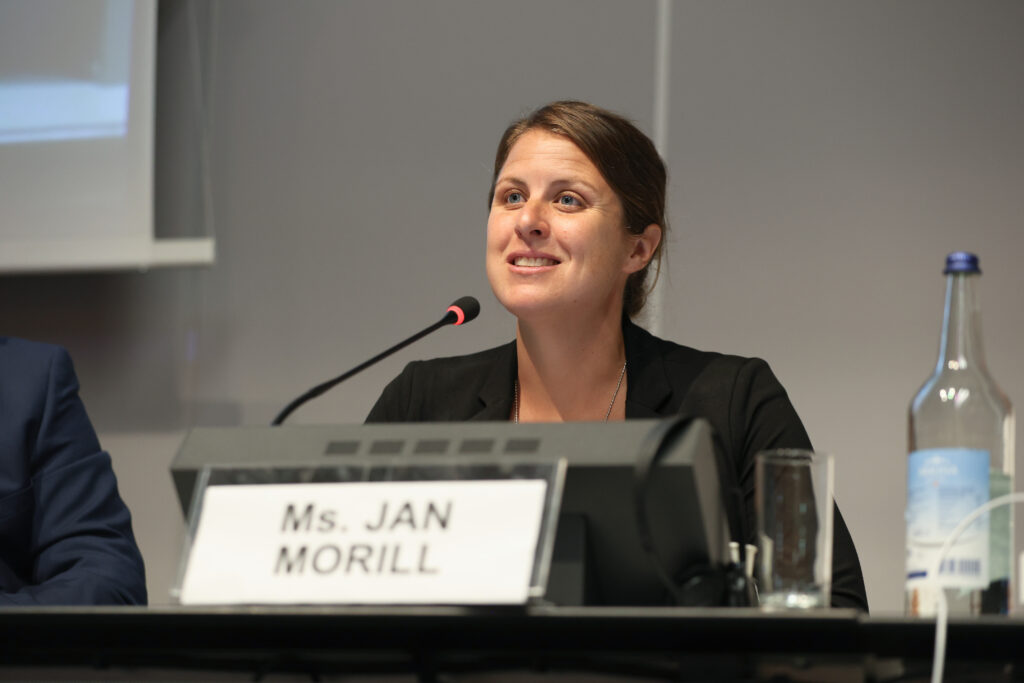
The UN Secretary General Panel on critical minerals is one of the most important voices providing global policymakers with recommendations based on scientific research and setting standards. This year Earthworks positively shaped the General Panel’s final 2024 report by emphasizing two key principles:
1) The need to transition to renewable energy cannot justify irresponsible practices at any point in the supply chain, from mining to recycling. No one should be left behind without fair treatment, legal redress, and the chance to meaningfully participate in decision-making.
2) Indigenous Peoples have the right to Free, Prior and Informed Consent for any mining projects on their lands.
Vital reports released in the last year include:

Certified Gaslighting
It’s been one year since Earthworks and Oil Change International released the first investigative report into “gas certification” schemes. No matter the label methane gas is a still threat to people and the planet.

Minimizing Mining Impacts on the Road to Zero Emissions Transport
We have the technology and strategies available to avoid the harmful impacts of mineral intensive electric vehicle production. Now we just have to implement them.

Total Disregard, A comprehensive study of TotalEnergies’ fracking operations and impacts in Arlington Texas
Earthworks used Optical Gas Imaging (OGI) to record TotalEnergy’s harmful pollution near homes and even playgrounds in Arlington, Texas.
Your Support Makes Our Work Possible
Earthworks helps families on the front lines of mining, drilling, and fracking. We use sound science to expose health, environmental, economic, social, and cultural impacts of mining and energy extraction. To support our efforts, please consider a tax-deductible donation today that will go toward our work reforming government policies, improving corporate practices, influencing investment decisions, and encouraging responsible materials sourcing and consumption.

